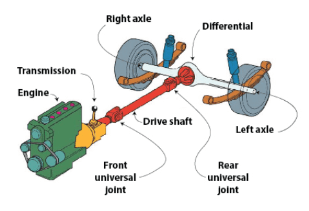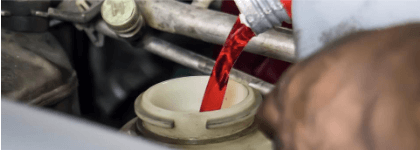As the seasons change, it is time for Colorado drivers to face the realities of winter driving. Most drivers know that cold and snow mean paying attention to engine oil, antifreeze, tires, and windshield wipers. However, very few drivers think about the need to service their transmission, differential, and in the case of 4-wheel drive vehicles, transfer case. These key components of your car or truck’s driveline are not something that the average automotive repair shop has the tools or expertise to inspect and service, so they rarely mention them. However, you don’t want to wait until you are in the middle of a snowstorm to find out you have a problem that can leave you stuck on the road and facing major repair and towing bills!
What Is Your Vehicle’s Driveline?
In automotive terms, the drivetrain is everything involved in taking the power created by your engine and transferring that to the wheels themselves. The engine is first connected to the transmission, which controls when and how much of the engine’s power gets transferred. In a manual transmission, the driver controls this by shifting through a series of mechanical gears to regulate the ratio of power to the wheels. In an automatic transmission, the transmission itself regulates these ratios through a series of electronic and hydraulic controls that shift through the gears based on vehicle speed, engine RPM, and other factors. In a traditional rear-wheel drive vehicle, the power from the transmission is directed by a driveshaft back to the rear differential, which transfers that power to one or both rear axles. In a front-wheel drive vehicle, the transmission is connected to a front differential which likewise directs power to the front axles. In a 4-wheel drive or all-wheel drive vehicle, the transmission is connected to a transfer case that splits power between a front and rear differential and regulates power to both the front and rear axles. Sounds confusing, right?That means that your 2-wheel drive vehicle has a transmission and a differential, while your 4-wheel drive or all-wheel drive vehicle will have a transmission, a transfer case, and a front and rear differential. All of these items contain fluid or gear oil necessary for their proper function. Most of these units also have no dipstick that would allow you to check the fluid level or condition like you would engine oil, which means you have to put the vehicle up in the air and open the appropriate unit to check the fluid, often with specialized tools. This difficulty is why so many drivers never check these fluids, despite your vehicle’s manufacturer specifying service intervals of 30,000-50,000 miles. We often see vehicles brought to our shops with catastrophic damage that have gone 100,000 miles or more without the driveline components ever being serviced. This is a good way to rack up some very serious repair costs!
Why Winter is Hard on Your Drivetrain
We have discussed in the past the hazards to your vehicle of driving in heavy snow. However, it isn’t just deep snow that creates problems for your automobile. Cold temperatures themselves create problems for the components of your driveline and accelerate wear and tear. Your vehicle’s transmission is very sensitive to operating temperature, and cold weather can have many negative effects on an automatic transmission. If your vehicle has a manual transmission, it is not quite as sensitive to cold but can still have issues if the gear oil inside is old or breaking down. Cold creates changes in viscosity which can make it difficult or nearly impossible to shift, leaving you unable to operate your vehicle on the road. Moreover, slick conditions cause a higher likelihood of tire spinout for even the most experienced manual drivers, causing accelerated wear to differentials while also creating a safety hazard. An automatic transmission has a large number of components that are made out of aluminum, steel, rubber, plastic, and other synthetic materials. Cold temperatures cause each of these materials to shrink, and each will shrink and contract at different rates. As the vehicle runs until it reaches full operating temperature, this shrinking and contracting can lead to leaks, slipping, and failure to engage in a way that is potentially harmful to the transmission. These problems will start to magnify as the transmission gets more miles on it and internal wear begins to increase. This process is accelerated with small leaks that over time lead to a low fluid condition and overheating within the transmission and drivetrain components. Moreover, cheap, incorrectly spec’d, or simply old transmission fluid will get “thicker” as the cold temperatures increase viscosity, which will negatively affect your transmission’s ability to shift between gears. This is especially problematic on modern transmissions that now use ultra-low viscosity fluids, which are far more temperature sensitive than older transmission fluid types.
What To Do Before Winter
If you have an older vehicle or have not had your driveline serviced in some time, it is a great idea to get this taken care of before winter sets in. Take your vehicle to a drivetrain specialty shop and ask that the transmission, differentials, and transfer case (if your vehicle has one) be inspected. If they are in good shape, get services done on these critical components to ensure that they are in the best possible working order before the weather gets nasty. This could be a simple fluid exchange but in other circumstances, it could be more involved. For example, on some transmissions, it might be preferable to drop a transmission pan so that an old filter accumulating sludge can be replaced as well. Being proactive with the care of your vehicle’s driveline will guarantee that you are ready for winter and can potentially save you thousands of dollars in repair and towing bills for damaged driveline components. These considerations are especially important for 4-wheel drive vehicles. Most 4WD vehicles in Colorado are operated strictly on regular roads (as opposed to off-road recreation), meaning that most drivers only engage the 4-wheel drive when they are in bad weather and really need it. Because of this, we often see vehicles brought to our shops during the winter that have damaged 4-wheel drive systems that have not been used or checked since the previous winter and the driver had no idea the system was inoperative until they got stuck or stranded. Keep in mind, beyond the common mechanical components, many of these modern 4-wheel drive systems have electronic components, such as actuators, that can naturally go bad between seasons. If you want to make sure your transmission, transfer case, or differential are in good operating condition, contact Advanced Transmission Center at either of our locations and we’d be happy to help! Unlike dealerships or many independent repair shops, we are driveline specialists trained to fix issues related to a vehicle’s drivetrain. You can reach out to either location that is most convenient for you.
Advanced Transmission Center is a Colorado-owned and operated auto repair shop with locations in Denver / Lakewood and Westminster. ATC specializes in driveline issues such as automatic transmission repair, four wheel drive repair, clutch replacement, differentials, manual transmissions and CVT. As Colorado's first AAA approved shop our goal is to provide accurate, timely service with exceptional customer satisfaction. All of our technicians are certified in the latest makes and models and we are one of the few transmission repair shops with a nationwide warranty.






 Free Customer Towing Service
Free Customer Towing Service  Free TrueTest™ Inspection
Free TrueTest™ Inspection  Fast Transmission Services
Fast Transmission Services  Comprehensive Warranty in Denver
Comprehensive Warranty in Denver 

























